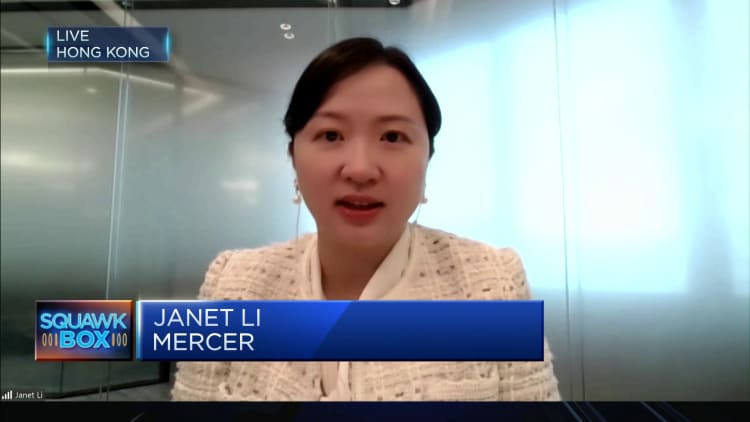

Anything that creates financial market turbulence will find a way and a channel of transmission.
Anne-Marie Gulde
International Monetary Fund
“We have seen capital flows increase, going to levels that we have last seen [sic] at the time of the taper tantrum and certainly anything that further raises interest rates will go through this channel will have impacts on borrowing costs in Asia.”
“It’s a very important concern that we have.”
The taper tantrum of 2013 occurred when investors reacted to the U.S. Federal Reserve’s plans to ease quantitative easing by selling off bonds quickly, triggering a plunge in prices.
The IMF cautioned that debt distress was prevalent in many countries in Asia and those with depreciating currencies against a stronger U.S. dollar could suffer a deeper cost-of-living crisis. For instance, the U.S. dollar is hovering close to a 24-year high against the yen.
Asian and Pacific economies: Real GDP, consumer prices
| Real GDP (annual % change) | Consumer prices (annual % change) | |||||
|---|---|---|---|---|---|---|
| 2021 | 2022 (f) | 2023 (f) | 2021 | 2022 (f) | 2023 (f) | |
| Advanced Asia | 3.7 | 2.2 | 2.3 | 1.2 | 3.6 | 2.6 |
| China | 8.1 | 3.2 | 4.4 | 0.9 | 2.2 | 2.2 |
| India | 8.7 | 6.8 | 6.1 | 5.5 | 6.9 | 5.1 |
| ASEAN-5: Indonesia, Malaysia, Vietnam, Thailand, Phillipines | 3.4 | 5.3 | 4.9 | 1.9 | 4.7 | 4.4 |
Source: International Monetary Fund
*Advanced Asia economies refers to Australia, Hong Kong and Macao, Japan, Singapore, South Korea, Taiwan and New Zealand
The IMF predicts global growth will slow to 2.7% in 2023 — that’s 0.2 percentage point lower than its July forecast.
In Asia, it also cut growth projections for China to 4.4%, down 0.2 percentage point from July’s forecasts. The fund also trimmed growth numbers for the ASEAN-5 group of Indonesia, Malaysia, Philippines, Thailand and Vietnam by the same amount to 4.9%.
Impact from U.K. crisis
When asked if the U.K. bond crisis would cause a contagion effect on Asian economies, Gulde said the U.K. bond crisis will have limited impact on Asian markets although “anything that creates financial market turbulence will find a way” to upset other economies.
“Pension fund investing in Asia is less than it had been… what I would want to emphasize is that anything that creates financial market turbulence will find a way and a channel of transmission,” she told CNBC.
“Certainly we don’t know all of the channels, but it’s certainly not good news for our countries in Asia as it is globally.”
Asset management company Mercer’s Asia Wealth Business Leader Janet Li agreed. She said Asian exposure to liability-driven investments, or LDIs, were less than the U.K. mainly because long-stream pensions in Asia were less common than lump-sum withdrawal plans.
Liability-driven investments, which are widely held by pension funds, match assets and liabilities to ensure that money to pensioners are paid out.
The crisis in the U.K stemmed from rising yields and plunging bond prices, which sparked collateral calls for pension funds to cover their LDI-related derivatives.
In an effort to post more cash as collateral against the falling value of LDIs, pension funds sold U.K. gilts — or long-dated government bonds — to raise cash.
The fire-sale pushed the Bank of England to intervene with a more orderly purchase of these offloaded gilts.

“Therefore, if we try to compare and look at whether Asia patient funds are more at risk right now, the short answer is no,” Li told CNBC’s Squawk Box Asia on Wednesday.
“But many defined benefit plans still have long end liabilities that they have to manage because of the recent spike in interest rates.”
However, there were some upsides for Asia, Gulde said.
As many Asian economies such as Japan and Hong Kong open up, increased human mobility will generate economic activity and may stall a slowdown. Separately, depreciating currencies in the region could mean higher exports for Asian economies, Gulde added.
China’s softer economy also eases core inflation in the region, the IMF pointed out.




